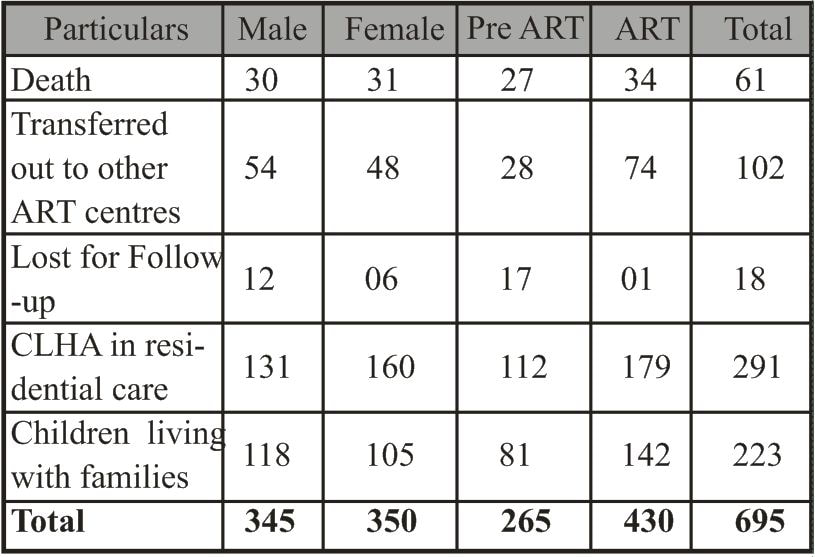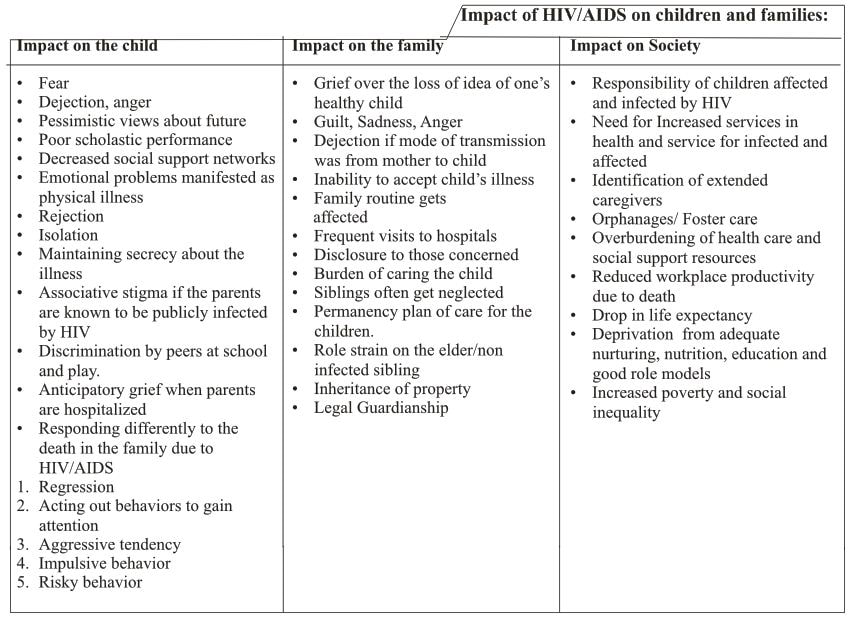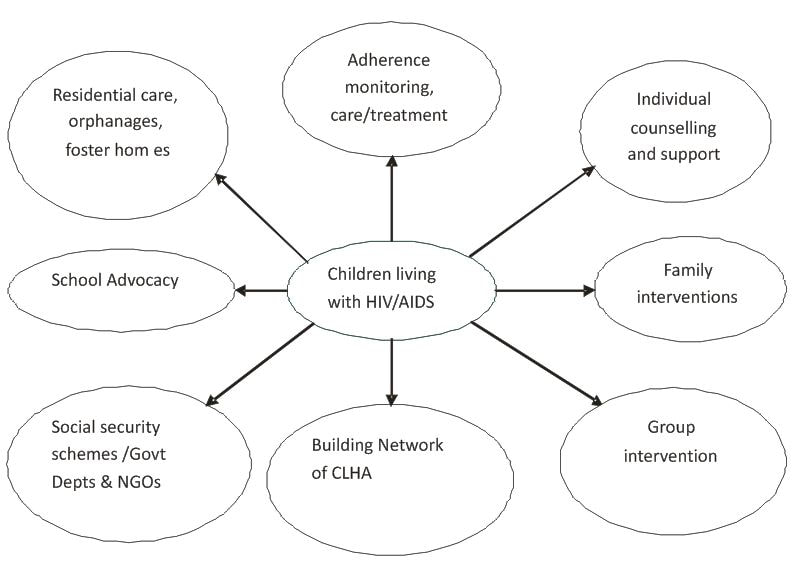|
Children of today are the youth of tomorrow. HIV affects this very precious generation and bear grave consequences to our future, our nation, the continent and the world at large. Children and adolescents are an ever-growing part of the HIV/AIDS epidemic. The impact of paediatric AIDS on the families and on the society at large is only beginning to be fully appreciated. The occurrence of a life threatening illness during childhood has a profound effect on the psychological, social and spiritual integrity on the child and the family. The life threatening illness adds additional challenges to the family where multiple family members are often infected, ill, dying or dead. In 2009, an estimated 2.5 million children under the age of 15 were living with HIV (UNAIDS 2010). India has an estimated 2.3 million people living with HIV, of these nearly one lakh (4 %) are estimated number of infected children .In Karnataka a cumulative of 10,915 children are registered and of these 3330 children are on Anti retro viral therapy (NACO 2010). About 15 million children under the age of 15 have lost one or both parents to AIDS, most of them living in sub-Saharan Africa. By 2010, it is estimated that more than 25 million children around the world will be orphaned by the AIDS pandemic (UNAIDS 2010). In addition, AIDS has caused children to experience the loss of their siblings, friends, relatives, teachers, doctors, and other significant people in their lives. India has an increasing population of children living with HIV and those who have lost either one or both parents to an AIDS related illness. However, there are no official estimates available on children affected and orphaned by HIV and AIDS in our country. India’s paediatric AIDS initiative, another significant step towards universal access, was launched by National AIDS Control Organisation in November 2006. This initiative allowed quick scaling up of the access to treatment for HIV infected children by making paediatric –formulated fixed dose combination drugs available for free in ART centres. The free availability of the combination of anti retro viral drugs has simplified and extended the lives of children. The goal of National Paediatric initiative is providing care, support, treatment for children infected and affected by HIV/AIDS. Currently there are 7 Regional Paediatric ART Centres providing services for children infected with HIV in India (Chennai, Mumbai, New Delhi, Kolkata, Hyderabad, Imphal and Bengaluru). However, beyond taking medicines, children and their caregivers/parents require information and education to understand the condition and ways to address their emotional, psychosocial and development needs (NACO 2007). The Regional Paediatric ART centre at Indira Gandhi Institute of Child Health, Bengaluru aided by Government of Karnataka, is a premier institute promoting child health care services. It was started in 1991. National AIDS Control Organization started a Regional Paediatric ART Centre at IGICH in November 2008. The Regional paediatric ART centre offers the following services:
Profile of children availing services at Paediatric ART centre (IGICH) Data provided till November 2010. IGICH has been treating children infected with HIV since 2005.The above table shows that there are 61 deaths of the infected children since 2005. 102 children have been referred or transferred to various other ART centres based on the convenience and needs of the family. 18 children have been lost for follow up, as they are not able to contact either due to lack of proper address or migrated. Little more than 45% (291) of children live in the residential care centres as they have lost their parents or their extended relatives are not providing care. 223 children are living with their families (parents, grand parents, siblings and extended family) which amounts to 32% of the total identified children from the ART centre. Needs of children living with HIV/AIDS Children have specific needs for growth and development, and of early diagnosis of infection besides needing a strong family support. Growth and development are important indicators of child’s health. HIV infection can lead to growth problems, developmental delays and developmental regression. Treatment options and nutritional needs are based on the child’s growth and development. Orphaned and vulnerable children (OVC), both infected and uninfected add to the complexity of the issue in terms of vulnerability, social security, livelihood, poverty, etc. Besides experiencing multiples losses, children infected by HIV/AIDS are likely to suffer from economic hardship, malnutrition, illness, abuse, lack of family support, unhygienic living conditions, loss of property and inheritance, etc. Practical and material needs are important for an infected HIV child, but emotional aspects are also very important for them. There are critical periods in the child's life that they could use extra support. These include when they are diagnosed, discrimination from peers as well as dealing with death. It might be beneficial for both the child and the parent to seek the advice or assistance of a counsellor to help through these rough times. Trauma may strike the child, if they happen to encounter the death of their parent(s) due to HIV as well. This will definitely be an emotionally trying step in their lives. Almost all children living with HIV have experienced discrimination and faced the effects of stigma. Children living in residential care settings are uncertain about their future or more fearful about the death and infections. The support of the extended families is not seen in these children. The routine activities like (taking medicine in queue, visiting hospitals in groups, etc) in the residential homes hinder their growth and development as they do not have parental touch. Frequent changing of caregivers in the residential homes disturbs the child’s emotions and lacks attachment figure. This would also affect the treatment plan. Children with HIV/AIDS and their families require intensive social and financial support; concrete services such as transportation to health care services ,nutrition, specialized home care or day care programs, ,mental health services, residential care ,legal Interventions and substance abuse assistance. The referrals also address the broad range of needs of infected and affected families in improving the care of people living with HIV/AIDS and their caregivers. Current Gaps in Services
Addressing the following gaps would make the prevention/treatment/rehabilitative programme more comprehensive in meeting the needs of children and families with HIV/AIDS.
Conclusion: Caring for children with HIV/AIDS and their families require compassionate, multifaceted assistance to the entire family support can help children recover from the devastating loss of parents and loved ones. With proper support, children with HIV/AIDS can progress through the appropriate developmental stages and grow alongside their peers. Through education, children and adolescents can learn to care for themselves, to protect themselves and those around them. They can also extend their awareness to educate others and help reduce the stigma. Family support, support from friends and communities, and health care professionals are essential for the overall well-being of children. References
Prathima.S Ph.D Scholar, Department of Studies in Social Work ,Manasa Gangothri, Mysore University, Mysore Dr. C. Usha Rao Assistant Professor, Department of Studies in Social Work ,Manasa Gangothri, Mysore University, Mysore. Dr. N. Janardhana Assistant Professor, Department of Psychiatric Social Work, National Institute of Mental Health and Neuro Sciences (NIMHANS), Bengaluru. |
Categories
All
Social Work Learning Academy50,000 HR PROFESSIONALS ARE CONNECTED THROUGH OUR NIRATHANKA HR GROUPS.
YOU CAN ALSO JOIN AND PARTICIPATE IN OUR GROUP DISCUSSIONS. MHR LEARNING ACADEMYGet it on Google Play store
|
SITE MAP
SiteTRAININGJOB |
HR SERVICESOTHER SERVICESnIRATHANKA CITIZENS CONNECT |
NIRATHANKAPOSHOUR OTHER WEBSITESSubscribe |
MHR LEARNING ACADEMY
50,000 HR AND SOCIAL WORK PROFESSIONALS ARE CONNECTED THROUGH OUR NIRATHANKA HR GROUPS.
YOU CAN ALSO JOIN AND PARTICIPATE IN OUR GROUP DISCUSSIONS.
YOU CAN ALSO JOIN AND PARTICIPATE IN OUR GROUP DISCUSSIONS.
|
|









 RSS Feed
RSS Feed





